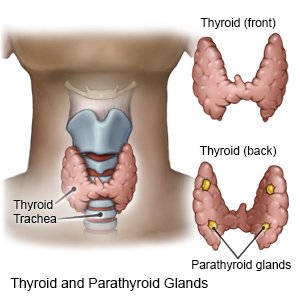Induced Thyroid Disorders
Medically reviewed by Drugs.com. Last updated on Oct 29, 2024.
What are induced thyroid disorders?
Induced thyroid disorders (ITD) are conditions that occur when certain medicines or treatments change the amount of hormone your thyroid produces. Your thyroid is a gland located at the front of your neck. Thyroid hormones regulate body temperature, heart rate, and weight gain or loss.
 |
What causes ITD?
- Medicines:
- Amiodarone is used to treat irregular heartbeats. It can cause thyroid hormone levels in your blood to go too low or too high.
- Interferon is used to treat tumors and other diseases, such as hepatitis C. This medicine directly attacks thyroid cells, or can cause your body to attack your thyroid gland. This may lead to high or low amounts of thyroid hormones in the blood.
- Lithium treats mental disorders. It can increase the production of antibodies against thyroid cells and cause hypothyroidism.
- Radiotherapy uses radiation as treatment for head and neck tumors. Radiation may cause damage to the thyroid cells and may decrease the production of thyroid hormones.
What are the signs and symptoms of ITD?
You may have signs and symptoms of one of the following thyroid conditions:
- Hyperthyroidism is when the thyroid gland makes too much thyroid hormone.
- Nervousness or restlessness
- Tired and hot
- A goiter (enlarged thyroid gland) that feels like a lump on your neck
- Diarrhea
- Tremors and a fast heartbeat
- Weight loss and hunger, even after you eat
- Eyes that bulge
- Hypothyroidism is when the thyroid gland does not make enough thyroid hormone.
- Weakness, muscle aches, or joint aches
- Dry, flaky skin, or thin and brittle fingernails or hair
- Changes in your voice, such as hoarseness
- Sudden weight gain
- Sleepiness or problems thinking clearly
- Slow heartbeat or trouble breathing
How is ITD diagnosed?
- Blood tests check the level of thyroid hormones in your blood.
- An ultrasound uses sound waves to show pictures of your thyroid on a monitor.
- A thyroid scan shows how well your thyroid is working. You may be given a dye before the pictures are taken to help healthcare providers see your thyroid better. Tell the healthcare provider if you have ever had an allergic reaction to contrast dye.
- Fine needle biopsy is a procedure used to take a sample of your thyroid gland for tests.
How is ITD treated?
- Thyroid medicines replace, increase, or decrease your thyroid hormone levels. They may also help control your signs and symptoms. You may need other medicines to treat fast heartbeats, nervousness, or trembling.
- A radioactive form of iodine is given to treat hyperthyroidism. It damages or kills some of the thyroid gland cells.
- Surgery to remove your thyroid may be needed if other treatments do not work.
Treatment options
The following list of medications are related to or used in the treatment of this condition.
When should I contact my healthcare provider?
- You have a fever.
- Your signs and symptoms return or become worse.
- You have pain, redness, and swelling in your muscles and joints.
- You have questions or concerns about your condition or care.
When should I seek immediate care or call 911?
- You have sudden chest pain or trouble breathing.
- Your heart is fluttering and you feel restless.
- You have slurred speech, problems with balance or walking, or cannot think clearly.
- You have swelling in your legs, ankles, or feet.
- You feel faint or had a seizure.
Care Agreement
You have the right to help plan your care. Learn about your health condition and how it may be treated. Discuss treatment options with your healthcare providers to decide what care you want to receive. You always have the right to refuse treatment. The above information is an educational aid only. It is not intended as medical advice for individual conditions or treatments. Talk to your doctor, nurse or pharmacist before following any medical regimen to see if it is safe and effective for you.© Copyright Merative 2024 Information is for End User's use only and may not be sold, redistributed or otherwise used for commercial purposes.
Learn more about Induced Thyroid Disorders
Treatment options
Care guides
- Acquired Hypothyroidism in Children
- Hyperthyroidism
- Hyperthyroidism in Pregnancy
- Hypothyroidism
- Subclinical Hypothyroidism
Symptoms and treatments
Medicine.com guides (external)
Further information
Always consult your healthcare provider to ensure the information displayed on this page applies to your personal circumstances.
